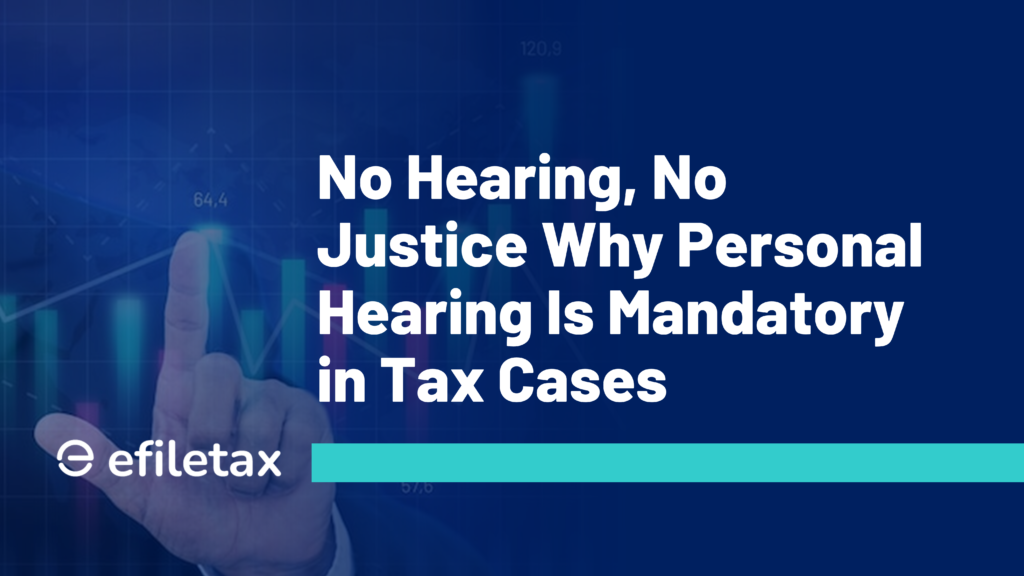
Personal Hearing Is Mandatory Before Passing the Order — Here’s What Every Taxpayer Must Know
Personal hearing mandatory before passing tax orders — this phrase has gained critical importance following multiple High Court rulings and CBIC clarifications. Whether you are dealing with a GST show cause notice or income tax reassessment, understanding your right to a personal hearing can protect you from arbitrary decisions.
Let’s simplify this complex but powerful legal safeguard.
What Is a Personal Hearing in Tax Matters?
A personal hearing is a right given to the taxpayer to present their case in person before a final order (like demand, penalty, or reassessment) is passed by a tax officer.
Key Laws and Rules:
- GST: Rule 142(1A) of CGST Rules, 2017
- Income Tax: Section 144B of the Income Tax Act, 1961
- Legal Right: Article 14 and Article 21 of the Indian Constitution (principles of natural justice)
Why Is Personal Hearing Mandatory?
Courts have repeatedly emphasized that natural justice cannot be compromised. Here’s why personal hearing is legally mandatory:
| Legal Basis | Description |
|---|---|
| Delhi HC – Garg Acrylics | SCN order quashed as no personal hearing was granted under Rule 142(1A) |
| Madras HC – M/s D.S. Wintex | Stressed on mandatory nature of pre-decisional hearing |
| Section 144B(7)(viii) | Under faceless assessment, if taxpayer requests a hearing, it must be allowed |
| CBIC Circular No. 125/44/2019-GST | Encourages discretionary but reasonable use of personal hearings |
✅ Expert View:
“Even under faceless regimes, if the taxpayer invokes the right to a personal hearing, it becomes binding on the tax officer to comply. Skipping this step can nullify the order.” — CA Suresh Jain, Tax Consultant
When Can You Demand a Personal Hearing?
- GST: After receiving a DRC-01A notice (pre-SCN) or DRC-01 (SCN)
- Income Tax: During faceless assessments or scrutiny
- Customs: Before penalty or confiscation orders under Section 122–127 of the Customs Act
✍️ Always make a written request within the given timeline in the notice. This creates a legal record of your right being exercised.
Practical Steps for Taxpayers
- Read the Notice Carefully
Look for any reference to opportunity of hearing. - File a Reply and Request Hearing
Respond to SCN with facts, documents, and a request for personal hearing. - Prepare for the Hearing
Carry relevant documents, case law citations, and prepare arguments. - Post-Hearing Representation
Submit a written note of arguments presented.
Real Case: GST Demand Quashed for No Hearing
In M/s Ozone India Ltd. vs Union of India (2024), the Gujarat High Court quashed a ₹3 crore demand order since the department failed to grant a personal hearing despite a written request. The court cited violation of principles of natural justice and Section 75(4) of the CGST Act.
Summary
Tax authorities must offer a personal hearing before final orders. It’s a legal right under GST and Income Tax. Know when and how to demand it.
FAQs
Q1: Is a personal hearing always granted automatically?
No. In faceless regimes, you must explicitly request it. Once requested, it becomes mandatory.
Q2: Can an order be challenged if no hearing was given?
Yes. Courts have quashed many such orders citing violation of natural justice.
Q3: Is video conferencing allowed for hearings?
Yes, especially under faceless assessment schemes and post-COVID guidelines.
Final Thoughts
The phrase “personal hearing mandatory before passing the order” is not just procedural — it’s your constitutional right. Whether you’re a business owner or an individual taxpayer, knowing and exercising this right could save you from wrongful tax demands.